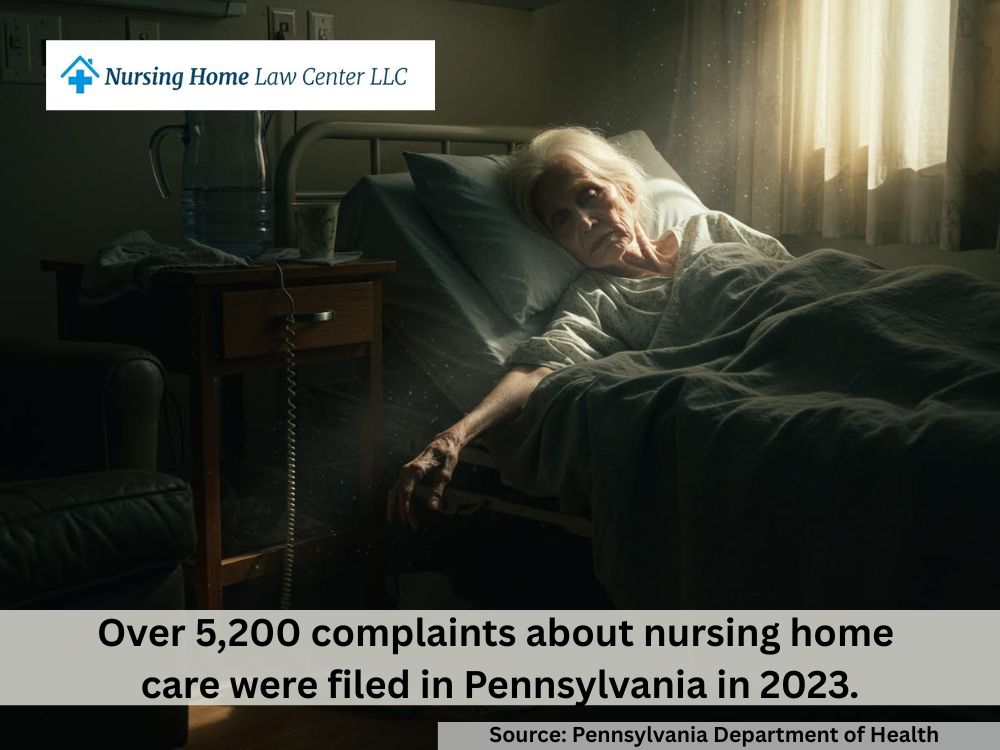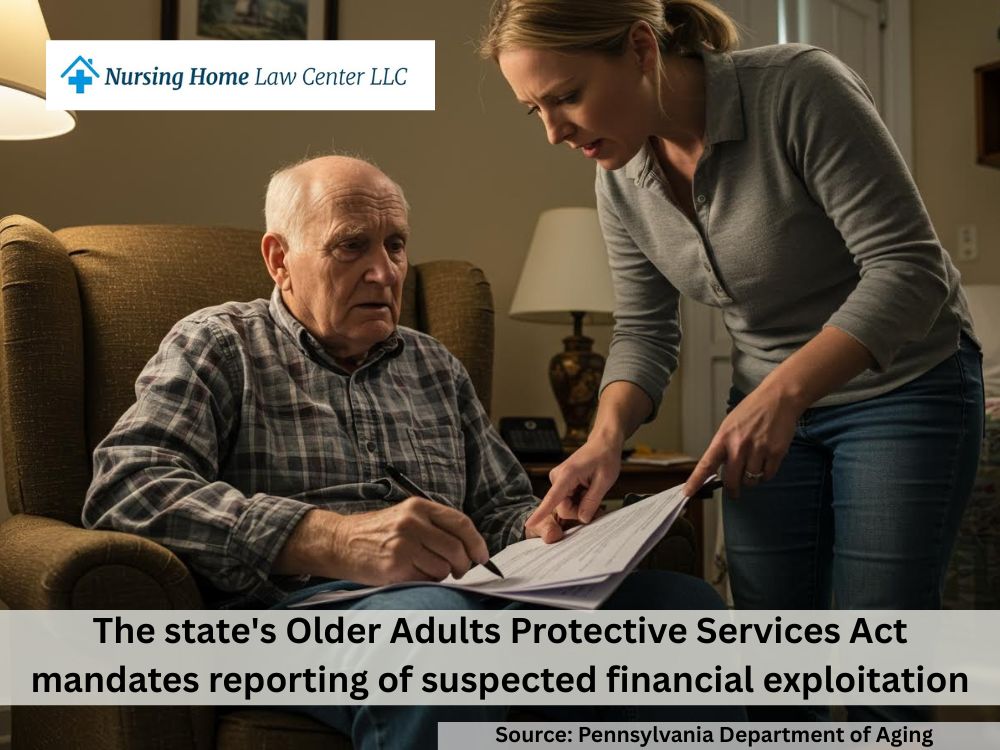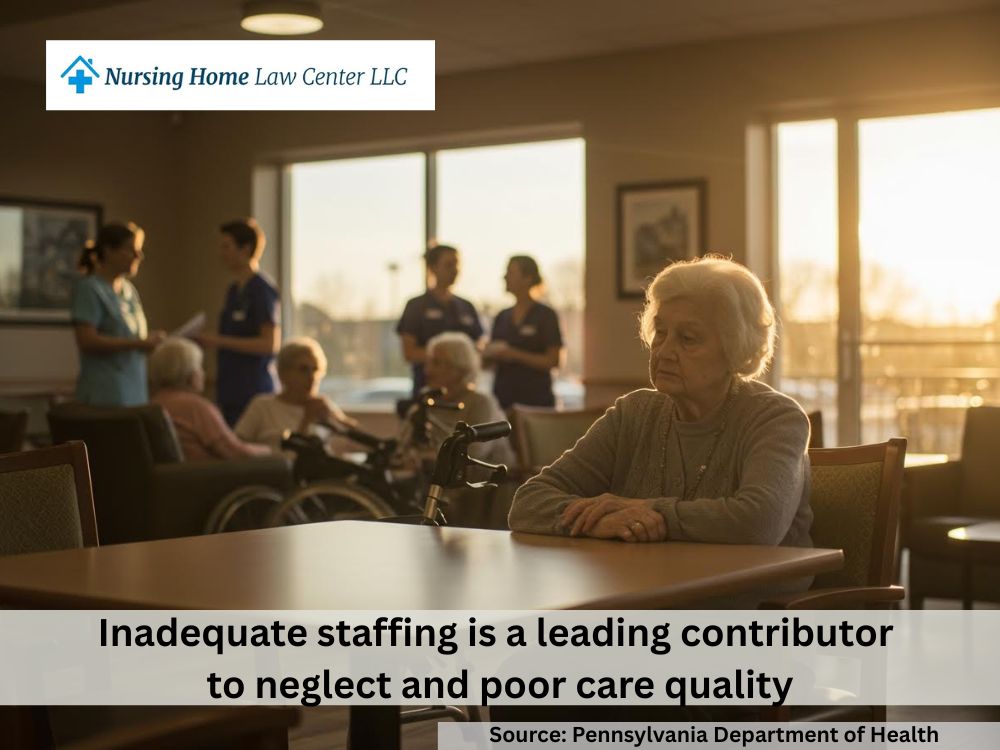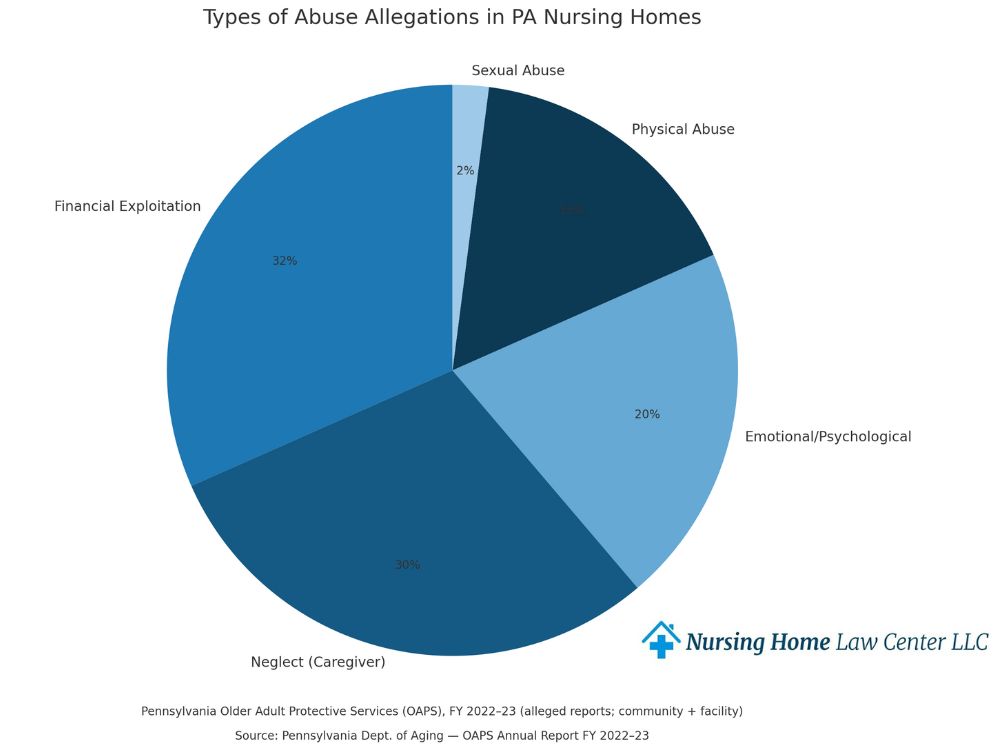The Nursing Home Law Center is committed to providing the legal resources necessary to hold negligent facilities accountable.
Pennsylvania Nursing Home Abuse Lawyer
Seeking Justice for Abuse and Neglect in Pennsylvania Nursing Homes and Assisted Living Facilities
If someone you love has suffered mistreatment in a care facility, a Pennsylvania nursing home abuse lawyer at Nursing Home Law Center is ready to help. We stand with families who have been betrayed by the very places meant to provide proper care.
We believe in your case and are here to support you every step of the legal process. Our nursing home abuse lawyers are committed to holding facilities accountable for the harm they’ve caused. This commitment is vital for families in the Delaware Valley, where high facility occupancy often leads to oversight failures. If you suspect your loved one is being mistreated in a local facility, a Philadelphia Nursing Home Abuse Lawyer can provide the immediate legal intervention necessary to protect their rights and secure their safety.
Settlements & Verdicts Recovered by Our Law Firm Serving Pennsylvania
Our law firm has secured meaningful settlements and verdicts in cases involving assisted living abuse and neglect, reflecting our commitment to holding negligent nursing homes accountable and helping families seek justice and financial compensation for the harm their loved ones have suffered.
$12,800,000 – Bed Sore Death at Southeastern Pennsylvania Nursing Home
After months of neglected care at a long-term care facility near Philadelphia, Margaret developed severe, untreated pressure ulcers that led to fatal complications. Staff repeatedly failed to reposition her or treat the wounds. The jury cited falsified medical records and chronic understaffing as key factors in awarding the verdict.

Types of Nursing Home Abuse Cases We Handle
Our law firm represents families across Pennsylvania in a wide range of nursing home abuse cases. Below are some of the most common types of abuse we investigate and pursue claims for on behalf of nursing home abuse victims.
Physical Abuse
Physical abuse involves the use of force that causes bodily harm, pain, or injury to a resident. This can include hitting, slapping, pushing, or the improper use of restraints. The elderly are often unable to defend themselves, making them especially vulnerable to this type of abuse. Unexplained bruises, fractures, or sudden behavioral changes may signal physical abuse.
Emotional Abuse
Emotional or psychological abuse is more complex to detect, but just as damaging. It may include yelling, intimidation, humiliation, or isolating a resident from others. Over time, this can lead to anxiety, depression, and withdrawal.
Staff members may use these tactics to control or manipulate elderly patients. If you notice a change in your loved one’s mood or behavior, it could be a warning sign of emotional abuse.
Sexual Abuse
Sexual abuse in nursing homes is one of the most serious and deeply disturbing forms of mistreatment. It includes any non-consensual sexual contact, often involving residents who are unable to communicate or give consent due to cognitive decline. Perpetrators can consist of staff, other residents, or visitors.
Signs such as STDs, unexplained injuries, fearfulness, or sudden changes in demeanor should never be ignored. Our elder sexual abuse attorneys work closely with families in these highly sensitive cases to protect victims and pursue legal action.
Financial Abuse
Financial abuse targets a resident’s personal assets, often through coercion, deception, or theft. This may involve forged checks, unauthorized account access, or pressure to change a will. Elderly residents in assisted living facilities are frequently taken advantage of due to memory loss or confusion.
Nursing Home Neglect
Nursing home neglect occurs when a facility fails to meet a resident’s basic needs. This can include a failure to provide food, water, clean clothing, personal hygiene, proper supervision, or access to medical care.
Negligent nursing homes often have understaffing problems or untrained workers, which can result in serious injuries or even death. Common warning signs include pressure ulcers, malnutrition, infections, and sudden health decline.
What Are the Causes of Elder Abuse in Nursing Homes?
Elder abuse in nursing homes and assisted living facilities is often the result of systemic failures within the facility. One of the leading causes is chronic understaffing, which leaves workers overwhelmed and unable to provide adequate medical care, supervision, or assistance with personal hygiene.
Poor training and lack of experience also contribute, especially in facilities that cut corners to save money. In some Pennsylvania facilities, staff are not adequately vetted, increasing the risk of hiring individuals with a history of abusive behavior.
Neglect may also occur when staff ignore residents’ needs due to time constraints or indifference. In more disturbing cases, abuse is intentional, committed by caregivers, other residents, or visitors. A culture of silence or fear can prevent victims from reporting abuse, allowing it to continue.
Whatever the cause, nursing home abuse is preventable, and negligent nursing facilities must be held accountable for the harm they cause. In Western Pennsylvania, systemic staffing issues have become a leading factor in preventable resident injuries. Families in Allegheny County who witness signs of neglect should consult a Pittsburgh Nursing Home Abuse Lawyer to investigate whether understaffing or poor training contributed to their loved one’s suffering.

How Common Is Elder Abuse in Pennsylvania?
Elder abuse continues to be a serious issue across Pennsylvania, with recent elder abuse statistics showing an apparent rise in reported cases. During the 2023–24 fiscal year, over 58,000 reports of suspected abuse were filed, a 9% increase from the previous year.
According to data from the Pennsylvania Department of Aging, 70% of those reports led to formal investigations, totaling 41,221 cases. Of those, 14,302 were substantiated, confirming serious concerns about nursing home neglect, home abuse, and other forms of mistreatment.
Current nursing home abuse statistics reveal troubling patterns. While self-neglect was the most common type of substantiated abuse at 49%, caregiver neglect accounted for 22% of confirmed cases.
Financial exploitation made up 32% of all allegations, reflecting a growing concern within assisted living facilities and nursing homes. Alarmingly, 46% of abusers were identified as family members, while caregivers followed closely at 33%.
What Legal Rights Do Pennsylvania Nursing Home Abuse Victims Have?
Victims of nursing home abuse in Pennsylvania have the right to pursue civil claims against negligent nursing homes and seek compensation for the harm caused.
Nursing Home Reform Act
The Nursing Home Reform Act (part of OBRA 1987) sets national standards for care in federally funded nursing homes. It guarantees the rights of nursing home residents to receive quality care, be free from abuse, and have their physical, emotional, and social needs met. Violations may form the basis for civil lawsuits.
Older Adults Protective Services Act (OAPSA)
Pennsylvania’s Older Adults Protective Services Act (OAPSA), as outlined in 35 P.S. §§ 10225.101 et seq., establishes mandatory reporting requirements and protective procedures for victims of elder abuse. It requires certain professionals and caregivers to report suspected abuse and provides authority for state agencies to investigate. Violations may lead to civil liability or criminal penalties.
OAPSA is one example of how elder abuse laws by state differ in terms of reporting duties, investigation, and enforcement. Understanding these legal protections is essential for families, caregivers, and professionals involved in elder care.
Other State Laws and Regulations
Additional Pennsylvania laws help protect the elderly from abuse and neglect. 55 Pa. Code § 14 covers licensing requirements and care standards for assisted living facilities and nursing homes, while 18 Pa.C.S. § 2713 makes neglect of a care-dependent person a criminal offense. Violations of these laws can support both civil and criminal actions against facilities and caregivers.

What Types of Financial Compensation Can Victims Recover?
Victims of nursing home abuse in Pennsylvania may be entitled to recover compensation for both economic and non-economic damages through a personal injury claim.
Economic damages include reimbursement for medical expenses related to injuries caused by abuse and neglect, such as hospital stays, medications, and long-term care needs. These damages may also include costs associated with relocating a resident to a safer facility, therapy for emotional distress, and lost income for family caregivers who had to take time off work.
Non-economic damages may be awarded for pain and suffering, mental anguish, and loss of dignity. In especially severe nursing home abuse cases, punitive damages may be available to punish negligent nursing homes and deter future misconduct.
Working with a Pennsylvania nursing home abuse lawyer can help ensure all damages are documented and that the full value of the case is pursued. Our firm is dedicated to serving residents throughout the Lehigh Valley who have been harmed by facility misconduct. An experienced Allentown Nursing Home Abuse Lawyer can help you gather the necessary medical evidence and facility logs to build a compelling case against those responsible for your family member’s injuries.
What Is the Average Payout for Nursing Home Abuse in Pennsylvania?
Based on Law.com’s VerdictSearch, the average payout for a nursing home abuse claim in Pennsylvania is approximately $1.9 million, with a median award of $400,000. Payouts range from as low as $6,400 to as high as $19 million, depending on the severity of harm, type of abuse, and the strength of the evidence presented.
Several factors influence the value of a nursing home abuse case, including:
- Type of abuse
- Extent of serious injuries or emotional distress
- Cost of ongoing treatment
- Strength of evidence
- Whether the case ends in a settlement, verdict, or arbitration
- Liability and conduct of the nursing facilities involved
Example Cases
$19,000,000 Verdict – Death from Falls, Malnutrition, and Untreated Bed Sores
Patricia O’Donnell’s estate alleged that 15 months of nursing home neglect at Brinton Manor led to repeated falls, a fractured hip, loss of dentures, severe malnutrition, and a Stage IV pressure ulcer that became infected. After being hospitalized and diagnosed with sepsis and aspiration pneumonia, she died under hospice care.
The jury found multiple facility owners and managers liable due to short staffing, mismanagement, and falsified records. Damages included pain and suffering, wrongful death, and punitive damages against all four corporate defendants.
How Long Do Victims of Nursing Home Negligence Have to File a Legal Claim?
In Pennsylvania, victims of nursing home negligence typically have two years to file a legal claim, as outlined in 42 Pa. Cons. Stat. § 5524(2). This period begins either from the date the injury occurred or when it was reasonably discovered.
Failing to act within this statute of limitations can result in losing the right to seek compensation. A Pennsylvania nursing home abuse attorney can help ensure your claim is filed on time.
How to Report Nursing Home Abuse and Neglect in Pennsylvania
If you suspect nursing home abuse or neglect in Pennsylvania, there are several agencies you can contact to file a report and help protect the victim. For issues involving nursing homes, contact the Pennsylvania Department of Health at 1-800-254-5164 or submit a complaint online through their Nursing Home Complaint Form.
For concerns involving assisted living facilities or personal care homes, reach out to the Department of Human Services’ Adult Protective Services at 1-800-490-8505. Reports can be made anonymously. You can also reach out to the Pennsylvania Long-Term Care Ombudsman Program at 717-783-8975. Ombudsmen serve as advocates for nursing home residents and can help resolve care-related concerns.
Another resource is your local Area Agency on Aging, which investigates cases under the Older Adults Protective Services Act. If someone is in immediate danger, call 911 right away.
Who Is Legally Liable for Abuse and Neglect in Pennsylvania Nursing Facilities?
Multiple parties may be held legally responsible for nursing home abuse and neglect in Pennsylvania. Depending on the case, liability may fall on:
- The nursing home or assisted living facility
- Facility owners or corporate management companies that manage nursing home chains
- Nursing staff, aides, or caregivers
- Third-party contractors, such as hospice providers or therapists
- Medical professionals involved in the resident’s care
- In some cases, even other residents or family members

Common Defenses in Nursing Home Abuse Cases
In nursing home abuse cases, facilities and their legal teams often raise several common defenses. One is that the resident’s injuries were the result of pre-existing conditions or natural decline, not nursing home negligence. We counter this by using treatment records, expert testimony, and timelines to show how the harm was preventable.
Another defense is that the facility followed an appropriate care plan. We examine whether that plan was actually followed and whether it met the nursing home resident’s needs.
Some facilities claim they were unaware of the abuse. We investigate staffing records, internal reports, and communication logs to prove otherwise.
Lastly, defendants may argue that injuries were unavoidable. We demonstrate how proper care, supervision, and staffing would have prevented the harm. Our nursing home lawyers work to hold facilities accountable by exposing these weak or unsupported defenses.
How to Strengthen Your Case Against a Nursing Facility
Taking the proper steps early can make a significant difference in the success of a claim.
If you suspect home abuse or neglect, report it immediately to state agencies and request a full investigation. Document everything. Take photos of injuries, keep notes of conversations with staff, and save all treatment records.
Get a second medical opinion to confirm any signs of bodily harm, malnutrition, or bed sores. Preserve any physical evidence, such as soiled bedding or missing belongings.
Consult with a Pennsylvania nursing home abuse lawyer as soon as possible. An experienced legal team can help collect evidence, interview witnesses, and identify signs of negligent care that the facility may try to cover up.
How Our Pennsylvania Nursing Home Lawyers Can Help
Our Pennsylvania nursing home abuse lawyers represent nursing home abuse victims and their families throughout the state. We investigate claims involving physical abuse, sexual abuse, neglect, and assisted living abuse, working to hold negligent facilities accountable. Our services include gathering evidence, consulting with experts, interviewing witnesses, and filing a personal injury claim on your behalf.
We also handle communication with insurance companies and facility lawyers, so you don’t have to. Our law firm is here to pursue justice and secure the compensation your family deserves.
We can help you take legal action against:
- Midtown Oaks Health & Rehab Center
- Rochester Residence And Care Center
- Kadima Rehabilitation & Nursing At Latrobe
- Ridgeview Healthcare & Rehab Center
We serve clients in Allentown, Philadelphia, Pittsburgh, and beyond.
FAQs
How much do Pennsylvania nursing home abuse attorneys cost?
Our Pennsylvania nursing home abuse attorneys work on a contingency fee basis, meaning you pay nothing up front. We only collect legal fees if we secure compensation for your case. If there’s no recovery, you owe us nothing.
Who can file a nursing home abuse claim in Pennsylvania?
A claim can be filed by the victim, a legal guardian, or a loved one, such as a spouse, child, or executor of the estate. A nursing home abuse lawyer can help determine who has legal standing based on the circumstances of the case.
Consult a Pennsylvania Nursing Home Abuse Lawyer
If you believe your loved one has suffered from nursing home abuse or neglect, speaking with a Pennsylvania nursing home abuse lawyer can provide the clarity you need to understand your legal options. We offer a free consultation to review your situation, assess the available evidence, and explain the next steps in the legal process. Contact us today to learn how we can help you take action.

